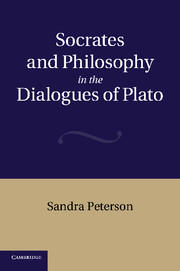Book contents
- Frontmatter
- Contents
- Acknowledgments
- Abbreviations
- Preface
- Chapter 1 Opposed hypotheses about Plato's dialogues
- Chapter 2 Socrates in the Apology
- Chapter 3 Socrates in the digression of the Theaetetus:
- Chapter 4 Socrates in the Republic, part i: speech and counter-speech
- Chapter 5 Socrates in the Republic, part ii: philosophers, forms, Glaucon, and Adeimantus
- Chapter 6 Socrates in the Phaedo: another persuasion assignment
- Chapter 7 Others' conceptions of philosophy in the Euthydemus, Lovers, and Sophist
- Chapter 8 Socrates and Plato in Plato's dialogues
- Chapter 9 Socrates and philosophy
- Bibliography
- Index of passages cited
- General index
Chapter 3 - Socrates in the digression of the Theaetetus:
extraction by declaration
Published online by Cambridge University Press: 03 May 2011
- Frontmatter
- Contents
- Acknowledgments
- Abbreviations
- Preface
- Chapter 1 Opposed hypotheses about Plato's dialogues
- Chapter 2 Socrates in the Apology
- Chapter 3 Socrates in the digression of the Theaetetus:
- Chapter 4 Socrates in the Republic, part i: speech and counter-speech
- Chapter 5 Socrates in the Republic, part ii: philosophers, forms, Glaucon, and Adeimantus
- Chapter 6 Socrates in the Phaedo: another persuasion assignment
- Chapter 7 Others' conceptions of philosophy in the Euthydemus, Lovers, and Sophist
- Chapter 8 Socrates and Plato in Plato's dialogues
- Chapter 9 Socrates and philosophy
- Bibliography
- Index of passages cited
- General index
Summary
THE DIGRESSION AND ITS SETTING
A famous passage in the Theaetetus presents a challenge for my thesis that the Socrates of any of Plato's dialogues is profoundly the same as the Socrates of the Apology. Socrates, the main speaker of the passage (172–177), labels it a “digression” (parerga: “by-work”) at 177b8. Not only does the Socrates of the digression seem different from the Socrates of the Apology, he also seems different from the Socrates of the rest of the Theaetetus. In the surrounding dialogue Socrates deploys argument, analysis, and critical reflection of the greatest interest as he considers the theme question: “What is knowledge?” The digression has no argument, analysis, or critical reflection. It has both dismayed and fascinated readers. Gilbert Ryle calls it “the philosophically quite pointless digression.” On the other hand, Myles Burnyeat credits the passage with “impassioned otherworldliness.” He says:
Plato puts the full power of his rhetoric into an extreme expression of his own vision of the human condition.
However, Burnyeat also recognizes the two faces of the passage. He says that today's readers
are…likely to find [it] alien and repellent, even as we are gripped (despite ourselves) by the sweep and force of the rhetoric.
I will admit immediately that I do not at all have the experience that Burnyeat describes of being gripped despite myself by the sweep and force of its rhetoric.
This chapter will pursue Ryle's insight that the passage is philosophically pointless.
- Type
- Chapter
- Information
- Socrates and Philosophy in the Dialogues of Plato , pp. 59 - 89Publisher: Cambridge University PressPrint publication year: 2011
- 1
- Cited by

